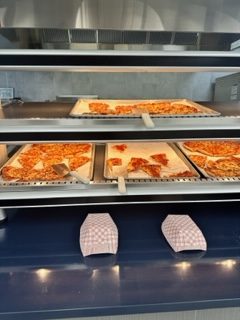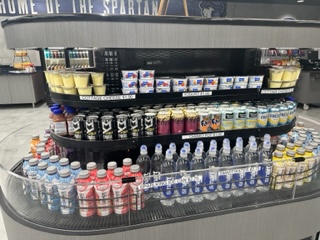Downfalls and uprising in the kitchen
June 5, 2023
School lunch is mandated to be available for all students daily. The goal for school lunches is to provide nutritional options for all students, no matter their financial situation, or allergies they have.
Cyndi Frost, the Lunch Staff Manager has worked in the food industry for 35 years, with 15 of those years being at the high school. She started working first at Blaine, followed by Cooper, Bryant, and the middle school. The main issue she has seen with providing food to those with allergies is the amount of waste that they’ve had before COVID-19, and the cost of the supplies. Frost loves when students give the staff input on food for lunch and she wants a survey to gauge what everyone in the school likes and things they want to have added.
“If your student has a doctor’s slip saying that you are allergic to dairy or wheat we offer lactose free milk but the only gluten free option is the taco bar,” Frost said.
Having allergies should not be a reason people aren’t provided with a nutritional selection like those who do not have the issue. There are people that don’t eat lunch because not enough gluten free, dairy free, or vegan options are available.

(Belle Modeen)
Junior Emily Reno has been gluten free for almost a year, diagnosed in April of last year. She brings her own food from home most days because she can’t have the main courses provided. Her favorite thing to eat at lunch is cantaloupe, string cheese, granola bars, and meat sticks. She would like having more options such as potatoes, food that doesn’t involve wheat, and a different food preparation so as not to have cross contamination.
“If you can’t bring your own lunch from home it can be a problem if you can’t have the food provided, because some will go without eating all day,” Reno said.
This year the lunches have been set up differently and have been planned out. On Mondays they provide Chinese food, Tuesday is either chili or American food, Wednesday and Thursday are pasta days, and Fridays are random. The school was given a new pizza oven this year. They’ve tried out new pizzas such as chicken alfredo and mac and cheese pizza. They provide lactose free milk to those with allergies, but most of their main foods that are planned out for the week are not allergy free for students.
School Nutrition Manager, Jeff Tespa, has worked in the food service for five years. He says that they’ve tried new recipes in the kitchen this year, and are using different products because during COVID-19 it was hard with the price of everything. He also says that they’ve tried to adapt around those with allergies, but it’s tough.
“We’ve provided a good salad bar for students with allergies, but with availability of the product and the cost of providing it, is hard to keep up with,” Tespa said.
This year the cafeteria received 400 pounds of produce from Brule River farm on November 11 of this year, providing squash, potatoes, onions, and apples. The lunch team has partnered with Bayfield Food Cooperative for many years and most of the fruits and veggies come from Northern Wisconsin. In the past there was a Veggie Burger option but there was said to be too much waste, therefore the lunch staff got rid of it.
Sophomore Aubree Munich has been vegetarian for a year and a half due to environmental reasons and issues, but mostly because of a dislike for
meat. She splits the days that she brings lunch and eats school lunch. On Thursdays she always has school lunch because of the Caesar salad option. She thinks that it would be better if they were more adaptable to kids with allergies. She says that it’s hard to choose meals at lunch because most things have meat or are cross contaminated.

“If kids were more mature, options for food like fruit and salad would be better and we could have gluten free bread, and vegan options which would be nice,” Munich said.
If you or someone you know is going without lunch due to an allergy, contact a school counselor or the School Board office to ask for accommodations. This will help advocate for yourself and the student body, especially for those that have allergies and aren’t able to bring school lunch from home.


